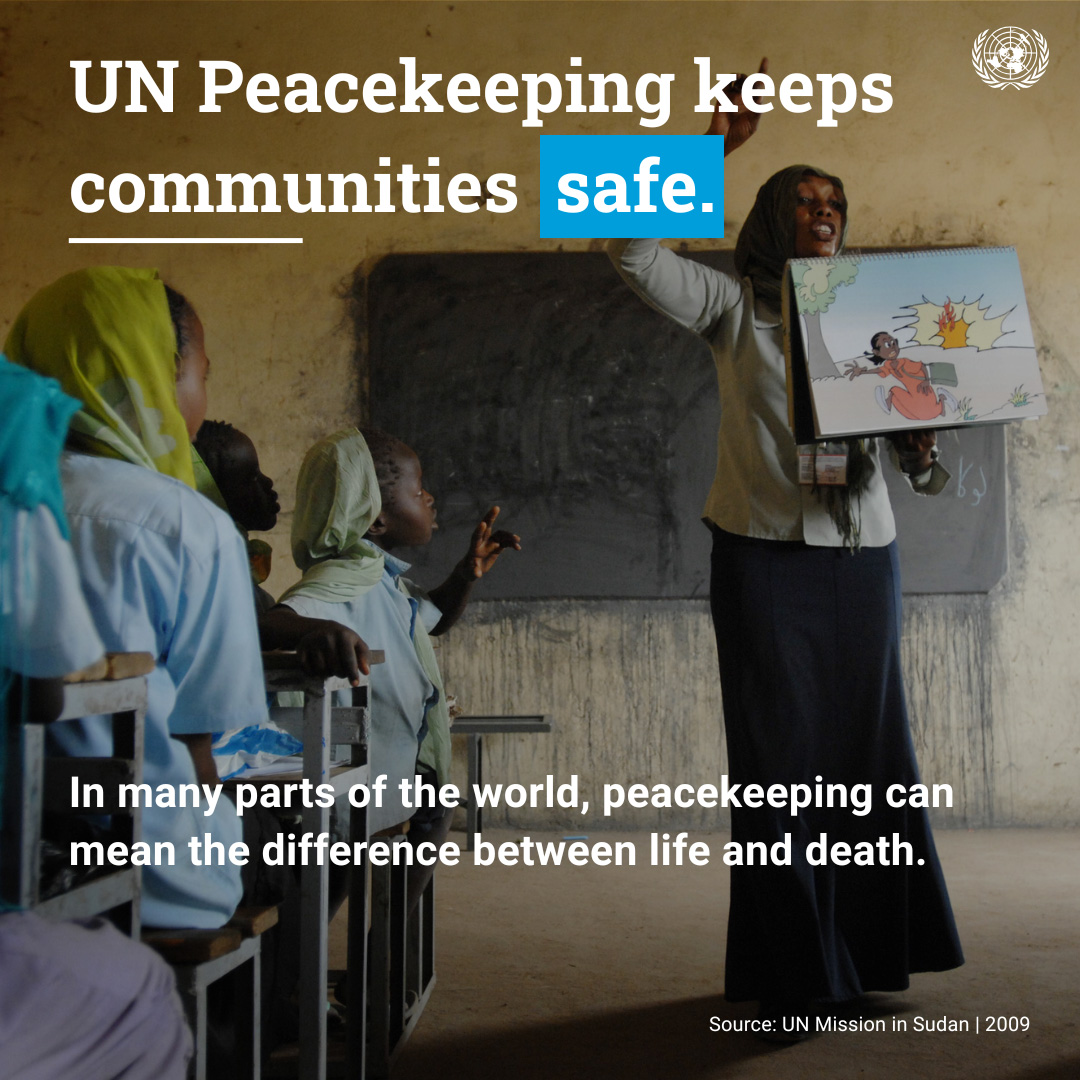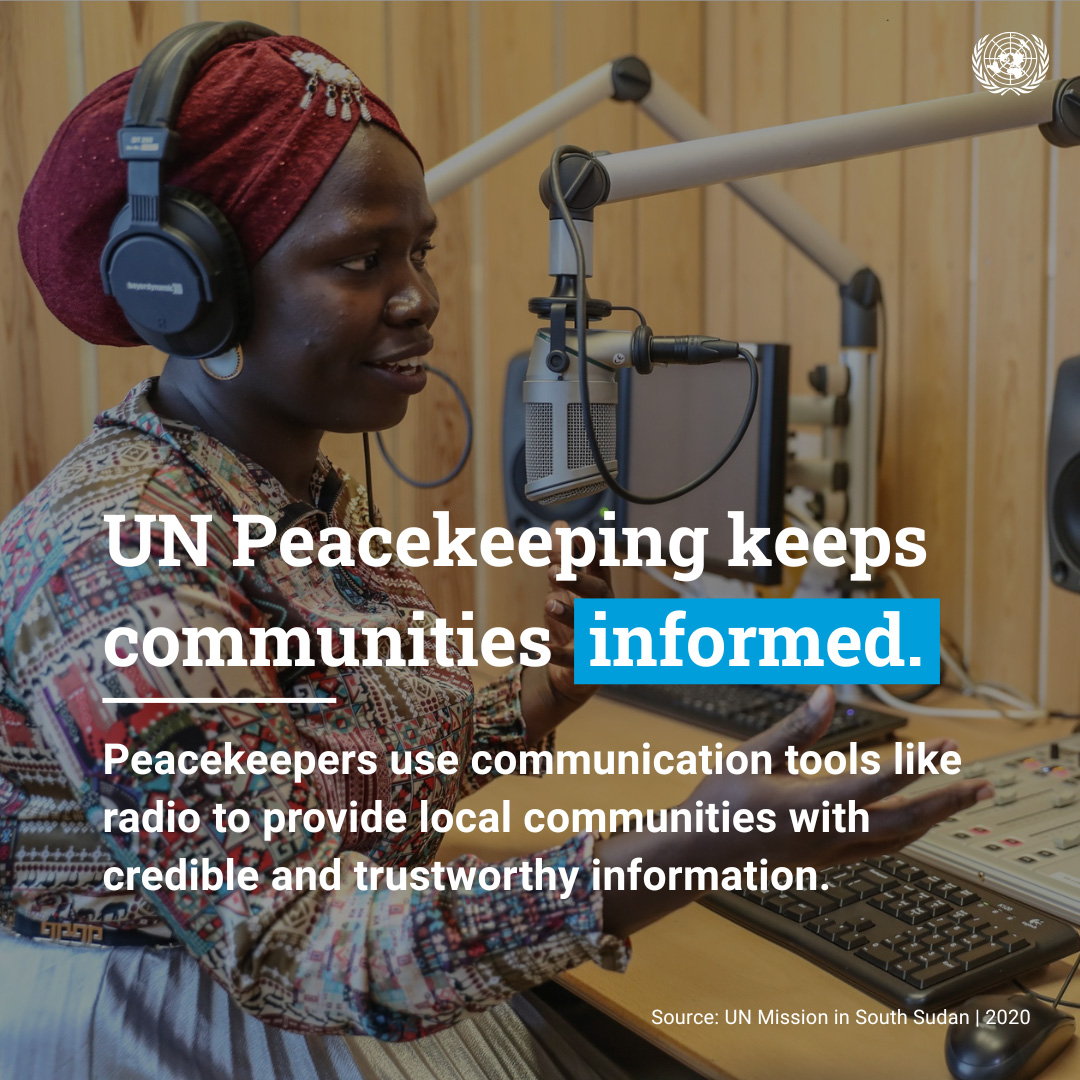UN Peacekeeping saves lives
×
UN Peacekeeping is a vital tool that protects civilians from violence, facilitates the delivery of lifesaving aid and creates safer environments in conflict and disaster zones.
In Haiti, a disaster-prone country, peacekeepers were on the frontlines, providing immediate security and crucial logistics support for aid delivery, following the 2010 earthquake, which tragically claimed the lives of over 100 peacekeepers.
In southern Lebanon, Blue Helmets facilitate humanitarian access and conduct bomb removal operations.
In South Sudan, when violence erupted in 2013 and 2016, peacekeepers protected hundreds of thousands of people within their compound. They continue to help communities cope with climate shocks by building dikes and roads across new flood plains, connecting people to markets and essential services.
“We are saving people not from bullets but floods,” explained Captain Taimoor Ahmed, an engineer with the mission in South Sudan.
From Cambodia to Liberia, and Sierra Leone to Timor-Leste, they oversaw the realization of major ceasefires and peace agreements following devastating civil wars, significantly contributing to many countries' transitions to peace, preventing a relapse into widespread conflict.
Learn more about UN Peacekeeping’s Protection of Civilians mandate.
Caption: Medics at the UN Stabilization Mission in Haiti help a young patient injured during the 2010 earthquake.
UN Peacekeeping is a symbol of solidarity
×
Understanding that lasting peace in conflict-affected regions hinges on political settlements, UN Peacekeeping proactively utilizes diverse methods to foster political solutions.
In Cambodia, peacekeepers managed a complex post-civil war transition by disarming former combatants, repatriating refugees, organizing free and fair elections and laying the groundwork for a new government and civil administration.
In Namibia, peacekeepers secured a historic election by establishing over 2,000 registration sites and providing extensive electoral support, enabling Namibians' first vote. The resulting 97 percent turnout paved the way for the country’s independence and UN membership.
The UN-supported 2011 referendum that granted South Sudan independence saw peacekeepers remain to help the world's newest nation establish sustainable peace and long-term state institutions. South Sudan soon became the UN's 193rd member, illustrating the UN's significant role in facilitating political transformations toward self-determination and statehood.
Learn more about UN Peacekeeping’s work in advancing political solutions to conflict.
Caption: The UN Transitional Authority in Cambodia oversees the voluntary repatriation of Cambodians returning from refugee camps in Thailand aboard a UN Refugee Agency train.
UN Peacekeeping empowers women and girls
×
To build and sustain peace, peacekeeping prioritizes meeting people’s needs. In conflict-affected countries, the destruction of essential infrastructure like schools, medical facilities, and transportation networks can severely impede efforts to establish lasting peace.
Engineers and sappers play a crucial role in peacekeeping operations by helping communities recover and rebuild after wars and natural disasters.
Near Juba, South Sudan’s capital, peacekeepers built new classrooms, a football field and a playground for a small school serving a community largely dependent on subsistence farming with limited access to education.
In the Democratic Republic of the Congo, peacekeepers constructed an Ebola Treatment Centre in North Kivu and rehabilitated and expanded the road to the facility during a critical disease outbreak.
In Liberia all-female police units served as powerful role models, contributing to a significant increase in local women joining the Liberian national security forces. “These women want to emulate you in the way you’ve served this country,” said the then Liberian President Ellen Sirleaf Johnson as they departed in 2016.
In Syria, peacekeepers refurbished schools as part of a Quick Impact Project, a peacekeeping initiative designed to address the urgent needs of local communities.
“The roof of the school was leaking in the classroom, and water was dripping on our heads. Now it is dry and warm in winter in the classrooms,” said a student at the refurbished Faouar School in Syria, one of the 400 children who benefited.
Learn more about UN Peacekeeping’s Quick Impact Projects for communities.
Caption: Engineering peacekeepers with the UN Organization Mission in the Democratic Republic of the Congo rehabilitate the road to the Ruzizi One Dam Power Plant, the only source of electricity for the east of the country.
UN Peacekeeping promotes justice and the rule of law
×
Peacekeeping efforts are more effective at protecting local communities when they consider the unique needs, contributions, and perspectives of all people, especially women and girls, as emphasized in the Women, Peace and Security (WPS) agenda.
Employing women in all roles within peacekeeping operations—particularly in leadership—significantly enhances their effectiveness. Women peacekeepers serve in diverse functions, including patrols, security checkpoints, intelligence gathering, law enforcement, and community engagement, often representing a beacon of hope for many local girls and women.
In Liberia, all-female police units served as powerful role models, contributing to a significant increase in local women joining the Liberian national security forces. “These women want to emulate you in the way you’ve served this country,” said the then Liberian President Ellen Sirleaf Johnson.
In the Central African Republic, peacekeepers have conducted outreach programmes, including self-defence training for women and girls, to enhance their safety and security. In South Sudan, peacekeepers collaborated with local women’s groups to advocate for their participation in peace talks
Achieving gender parity in peacekeeping, especially among leaders and uniformed personnel, has been a top priority for the UN. The organization, reliant on member countries for military and police contingents, has launched several initiatives to urge and incentivize troop- and police-contributing countries to deploy more women peacekeepers.
While progress has been made, it has been slow, particularly within military contingents. Between 1957 and 1989, only 20 uniformed women served in peacekeeping. As of January 2025, this number has risen to over 6,200. However, of more than 61,000 uniformed peacekeepers, less than 10 percent are women.
Learn more about the WPS agenda.
Caption: The UN Interim Force in Lebanon’s first all-women foot patrol to engage with other women in the local community.
UN Peacekeeping keeps communities safe
×
Peacekeepers actively promote the rule of law and justice in conflict-affected areas through a range of crucial activities.
They support the rebuilding and reform of essential institutions like police forces, courts, and correctional facilities by providing training, resources, and technical expertise, thereby enhancing their capacity and accountability.
Beyond strengthening institutions and promoting accountability, peacekeepers actively work to protect human rights by monitoring situations, preventing violations and advocating for the integration of human rights standards into national laws and practices.
Peacekeepers often facilitate dialogue and reconciliation between communities in conflict, creating platforms to address grievances and build trust, which are fundamental for establishing a society governed by the rule of law and principles of justice.
With crucial support from the peacekeeping mission in South Sudan, a mobile court in Leer County recently broke through a decade-long silence of justice, addressing murder, forced marriage, and sexual and gender-based violence cases, offering long-awaited accountability to the community.
In 2018, peacekeepers in Haiti partnered with the government to establish the country's Court of First Instance which included the appointment of female judges and dedicated sessions specifically designed to tackle a backlog of cases and the prolonged pre-trial detention of women.
Learn more about UN Peacekeeping’s work in building rule of law and security institutions.
Caption: UN Police officers engage with communities in Port-au-Prince, Haiti, to better understand their needs.
UN Peacekeeping is cost-effective
×
UN peacekeeping is not only a lifesaving tool — it is a smart investment.
Peacekeepers have supported transitions from war to peace in many countries since 1948 at a fraction of what military activities have cost worldwide.
With a budget shared by all 193 UN Member States and representing a tiny fraction of global military spending (US$2.7 trillion) — around 0.5 per cent — UN Peacekeeping remains one of the most effective and cost-effective tools to build international peace and security.
Moreover, the cost of deploying and maintaining peacekeepers is often far less than the economic devastation caused by prolonged conflict, including the destruction of infrastructure, displacement of populations and loss of productivity.
According to the independent Global Peace Index, wars cost the world nearly US$20 trillion in 2023. That’s over 13 per cent of global GDP or an estimated US$2,380 per person.
By containing violence and creating a more stable environment, peacekeeping facilitates economic recovery and allows for sustainable development, ultimately yielding long-term economic benefits that far outweigh the initial costs of the peacekeeping operation.
In essence, peacekeeping is not merely an expenditure but a proactive measure that yields significant returns in terms of human lives saved, stability achieved, and the foundations laid for lasting peace and prosperity.
Caption: A peacekeeper with the UN Multidimensional Integrated Mission in Mali searched for landmines and other improvised explosive devices.
UN Peacekeeping keeps communities infromed
×
Radio has played a vital role in peacekeeping missions since the late 1980s as a powerful communications and community outreach tool.
Today, three peacekeeping missions have their own radio stations – Radio Miraya in South Sudan, Radio Okapi in the Democratic Republic of Congo and Guira FM in the Central African Republic.
Civilian peacekeepers who are radio producers and communications personnel use radio for vital news, early warnings about potential threats, and discussions on pertinent issues and educational programmes that empower communities to make informed decisions.
Moreover, radio stations provide an invaluable platform for local voices and perspectives, helping to foster reconciliation between divided communities.
Radio receivers and frequencies are relatively inexpensive and widely available, even in the most remote areas. In places with low literacy rates, radio programmes can reach a wider audience, fostering more inclusive information sharing. Radio stations can also provide information in local languages in real time.
Given its reach, radio is a reliable tool to counter misinformation and dispel harmful rumours. During the COVID-19 pandemic, Radio Miraya, which reaches two thirds of South Sudan, ran programmes to help counter the local population’s resistance to physical distancing.
In the Democratic Republic of the Congo, Radio Okapi worked with the government to provide on-air education to roughly 22 million children who could not leave their homes, transmitting essential French, math and reading lessons.
Learn about the impact of UN Peacekeeping radio stations.
Caption: A radio producer working for the UN Mission in South Sudan’s Radio Miraya.









